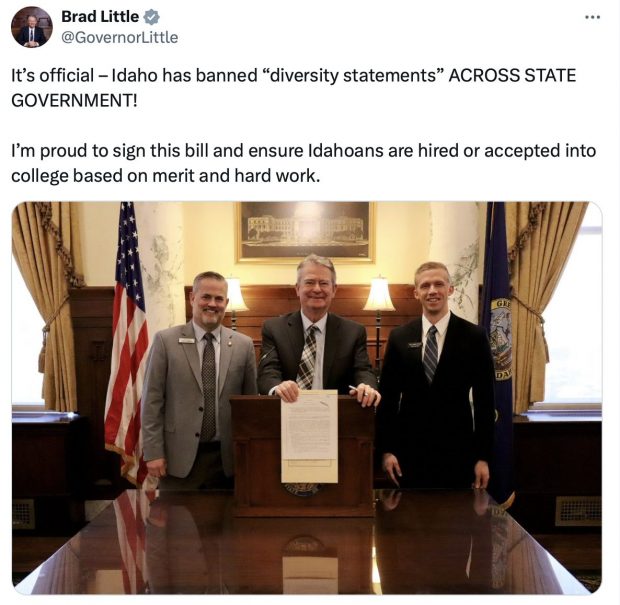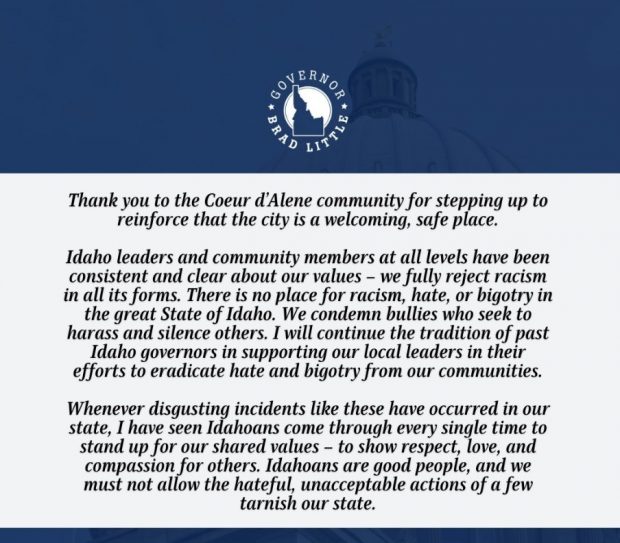Issues of race and diversity were woven through the 12th week of the 2024 legislative session.
Here’s what unfolded this week, day by day.
Monday: Gov. Brad Little trumpeted a new law banning campus diversity statements.
Senate Bill 1274 — which sailed through both houses, with support from all but one of the Legislature’s 87 Republicans — could have limited impact. A State Board of Education policy already forbids diversity statements in hiring. The new state law extends that language to the college admissions process.

Little actually signed SB 1274 into law on March 20. But on Monday, the governor took to X, the social media platform formerly known as Twitter. “It’s official – Idaho has banned ‘diversity statements’ ACROSS STATE GOVERNMENT!” Little wrote. “I’m proud to sign this bill and ensure Idahoans are hired or accepted into college based on merit and hard work.”
Little also posed for a bill-signing photo with SB 1274’s co-sponsors, Sen. Treg Bernt, R-Meridian, and Rep. James Petzke, R-Meridian. The post generated some 3,100 comments, many of them negative.
“Say the three white guys in the photo,” said one commenter.
Tuesday: The Legislature took its first step toward making diversity, equity and inclusion into an off-season study topic.
The Senate State Affairs Committee introduced a resolution that would create a DEI “interim committee.”
Senate President Pro Tem Chuck Winder said the objective is to get a sense of the prevalence of campus DEI programs, after years of controversy. “I think it’s time we actually gather some facts,” said Winder, R-Boise.
Sen. Melissa Wintrow — a Boise Democrat with more than 30 years’ experience in higher education — suggested that the committee was coming in with an agenda. She pointed to one passage in the two-page resolution creating the committee: It says the Legislature opposes using any public dollars on DEI.
“That’s basically saying we’re not going to do it, even if it is having a benefit on our campus,” said Wintrow, who added that the resolution would place unconstitutional restrictions on student activities.
The resolution awaits a Senate vote and still must pass the House in the waning days of the session. Winder and House Speaker Mike Moyle, R-Star, are co-sponsoring the resolution.
Wednesday: DEI issues dominated the House’s debate over a $15.9 million followup budget bill for higher ed.
The connection between the budget bill and DEI is tortured at best.
Idaho’s colleges and universities spend no “state-appropriated funds” on DEI, State Board Executive Director Matt Freeman said in a Jan. 10 memo to Sen. C. Scott Grow and Rep. Wendy Horman, co-chairs of the Joint Finance-Appropriations Committee.
Close to $7.8 million in the higher ed budget bill would go for staff pay raises. Another $7 million would go toward “operational capacity enhancement,” a discretionary fund of sorts. That money could go toward a variety of items, such as additional pay raises, the University of Idaho’s cybersecurity program and student retention programs at Idaho State University.
Nonetheless, hardline conservatives pushed for $3.2 million to $3.8 million in cuts, seeking to slash social justice programs that aren’t even funded in the budget.
“I’m asking you to send a message to our universities, as we have done before: This is not what we want,” said Rep. Barbara Ehardt, R-Idaho Falls, long a vocal opponent of campus DEI programs.
After a heated debate, the House passed the budget on a 38-30 vote. It now goes to the Senate — where, in past years, higher ed budgets have tended to pass more comfortably.
Thursday: A racial harassment complaint in North Idaho — the subject of national media coverage — triggered a tense Senate debate.
At issue is a complaint filed on behalf of members of the University of Utah’s women’s basketball team. Team members, who were staying in Coeur d’Alene while waiting to play in the women’s NCAA Tournament in Spokane, Wash., said they were walking between their hotel and a restaurant when they were subject to racist slurs. (Here’s the latest on the investigation, from the Spokane Spokesman-Review.)

The Senate quickly drafted a resolution on the issue. This wasn’t the first word on the matter; Little and Idaho Democratic Party chair Lauren Necochea condemned the incident, while the Kootenai County Republican Central Committee condemned “ALL forms of racial, religious, sexual, and political supremacy.” The Senate resolution included several strongly worded references to the Coeur d’Alene incident. “For the same reason that one cannot yell ‘fire!’ in a crowded theater, one cannot yell racial slurs at a group of young Black women while attempting to intimidate them,” the resolution reads, in part.
Senate State Affairs passed the resolution Thursday morning, and the full Senate took it up later that day.
What unfolded was one of the wildest Statehouse debates in recent memory. At one stage, Winder took the extremely rare step of issuing a call of the Senate — summoning all 35 members to the floor, under threat of being apprehended by state police. It didn’t come to that Thursday, but under the call, Sens. Brian Lenney, R-Nampa, and Phil Hart, R-Kellogg, returned to the chamber.
The Senate debate centered largely on the Coeur d’Alene incident, which remains under investigation.
“Has there been any actual evidence brought forward that this happened?” Lenney asked Senate Assistant Majority Leader Abby Lee, R-Fruitland, the resolution’s sponsor.
“There was a police report, it was founded, and I believe these women,” said Lee.
“That’s all, yeah,” said Lenney. “Thank you.”
Only Hart voted against the resolution. “I’m not aware of any of these facts, I’m not aware of the situation,” he said.
With the 33-1 vote, the resolution now goes to the House.
(For more coverage of Thursday’s debate, here are full stories from Logan Finney of Idaho Reports, Laura Guido of the Idaho Press, Kyle Pfannenstiel of Idaho Capital Sun and Ian Max Stevenson of the Idaho Statesman.)
Friday: The tensions from Thursday’s Senate vote lingered.
Hart stood to protest Thursday’s vote. Pointing out that he is both a North Idaho resident and a former University of Utah student-athlete, Hart said the resolution was rushed, forcing him to vote without all the facts he wanted.
The Senate quickly went at ease, and several lawmakers huddled on the Senate floor.
The Senate then adjourned until Tuesday.
